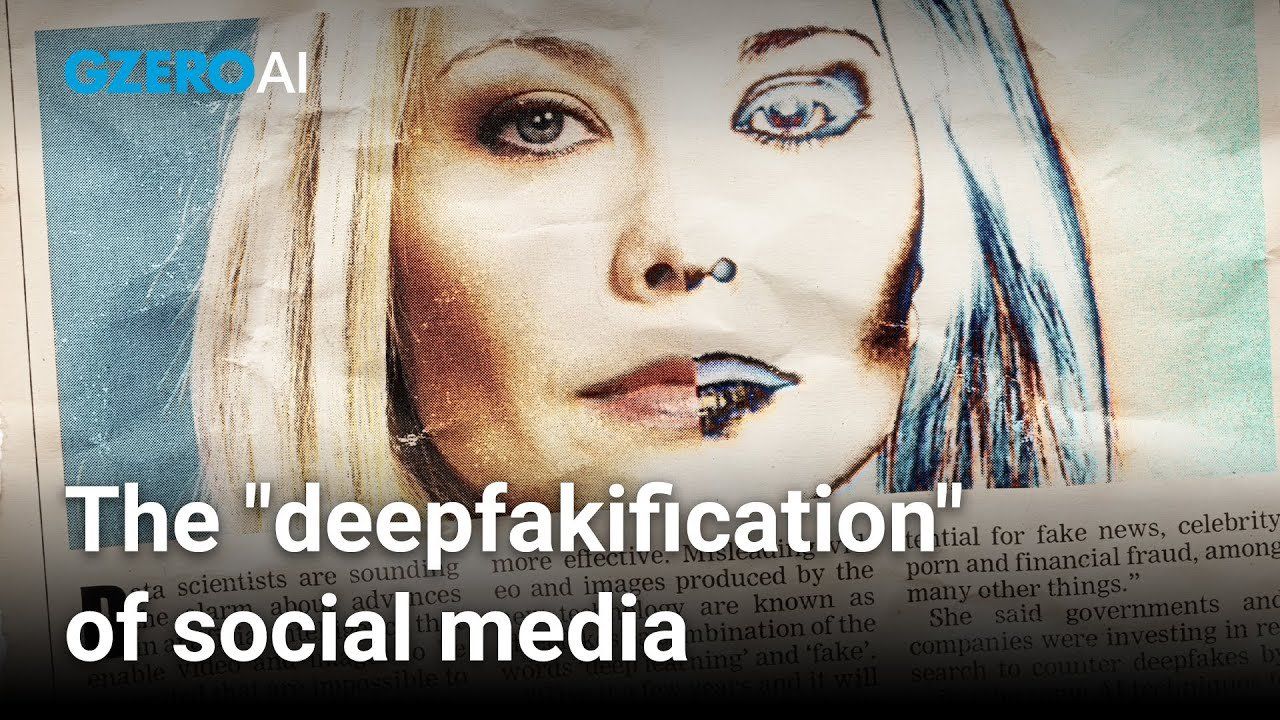GZERO AI Video
Social media's AI wave: Are we in for a “deepfakification” of the entire internet?

Social media's AI wave: Are we in for a “deepfakification” of the entire internet? | GZERO AI

In this episode of GZERO AI, Taylor Owen, professor at the Max Bell School of Public Policy at McGill University and director of its Centre for Media, Technology & Democracy, looks into the phenomenon he terms the "deepfakification" of social media. He points out the evolution of our social feeds, which began as platforms primarily for sharing updates with friends, and are now inundated with content generated by artificial intelligence.
So 2024 might just end up being the year of the deepfake. Not some fake Joe Biden video or deepfake pornography of Taylor Swift. Definitely problems, definitely going to be a big thing this year. But what I would see is a bigger problem is what might be called the “deepfakification” of the entire internet and definitely of our social feeds.
Cory Doctorow has called this more broadly the “enshittification” of the internet. And I think the way AI is playing out in our social media is a very good example of this. So what we saw in our social media feeds has been an evolution. It began with information from our friends that they shared. It then merged the content that an algorithm thought we might want to see. It then became clickbait and content designed to target our emotions via these same algorithmic systems. But now, when many people open their Facebook or their Instagram or their talk feeds, what they're seeing is content that's been created by AI. AI Content is flooding Facebook and Instagram.
So what's going on here? Well, in part, these companies are doing what they've always been designed to do, to give us content optimized to keep our attention.
If this content happens to be created by an AI, it might even do that better. It might be designed in a way by the AI to keep our attention. And AI is proving a very useful tool for doing for this. But this has had some crazy consequences. It's led to the rise, for example, of AI influencers rather than real people selling us ideas or products. These are AIs. Companies like Prada and Calvin Klein have hired an AI influencer named Lil Miquela, who has over 2.5 million followers on TikTok. A model agency in Barcelona, created an AI model after having trouble dealing with the schedules and demands of primadonna human models. They say they didn't want to deal with people with egos, so they had their AI model do it for them.
And that AI model brings in as much as €10,000 a month for the agency. But I think this gets at a far bigger issue, and that's that it's increasingly difficult to tell if the things we're seeing are real or if they're fake. If you scroll from the comments of one of these AI influencers like Lil Miquela’s page, it's clear that a good chunk of her followers don't know she's an AI.
Now platforms are starting to deal with this a bit. TikTok requires users themselves to label AI content, and Meta is saying they'll flag AI-generated content, but for this to work, they need a way of signaling this effectively and reliably to us and users. And they just haven't done this. But here's the thing, we can make them do it. The Canadian government in their new Online Harms Act, for example, demands that platforms clearly identify AI or bot generated content. We can do this, but we have to make the platforms do it. And I don't think that can come a moment too soon.
People in support of former South Korean President Yoon Suk Yeol rally near Seoul Central District Court in Seoul on Feb. 19, 2026. The court sentenced him to life imprisonment the same day for leading an insurrection with his short-lived declaration of martial law in December 2024.
65: The age of former South Korean President Yoon Suk Yeol, who was sentenced to life in prison on Thursday after being found guilty of plotting an insurrection when he declared martial law in 2024.
In an era when geopolitics can feel overwhelming and remote, sometimes the best messengers are made of felt and foam.
The Hungarian election is off to the races, and nationalist Prime Minister Viktor Orbán is facing his most serious challenger in 16 years.
Does skepticism rule the day in politics? Public opinion data collected as part of the Munich Security Conference’s annual report found that large shares of respondents in G7 and several BRICS countries believed their governments’ policies would leave future generations worse off.